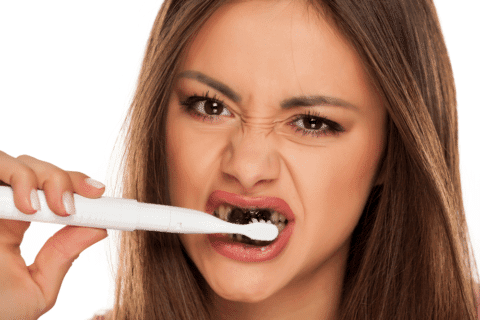Activated Charcoal is getting a lot of attention these days. Found in everything from face masks to ice cream, it’s being flaunted as the new go-to ingredient for solving a whole host of health and beauty related concerns. It’s biggest claim to fame? Teeth whitening. But despite all of the publicity, there’s one key question many are left with: What exactly IS activated charcoal and does it really work?
Before we dive into the benefits activated charcoal is credited with, let’s discuss what it actually is. First, it’s important to note that activated charcoal is not the same type of charcoal that you use for grilling. That charcoal is created to be flammable and could potentially contain carcinogenic ingredients – aka ingredients known for causing cancer. Activated charcoal, on the other hand, is created without any of those chemicals. According to Healthline.com, it’s “made from bone char, coconut shells, peat, petroleum coke, coal, olive pits or sawdust” and it is activated by being processed at very high temperatures. It is because of its’ mostly natural ingredients that people believe it to be an ideal and safe product to put in and on their bodies.
So is this naturally-derived dream product all it’s cracked up to be? In terms of your teeth, the answer is still a little unclear. From a structural standpoint, it’s porous state allows it to absorb materials, making it great for treating overdoses and calming upset stomachs. This has led many to believe that when scrubbed into the teeth it would be prone to absorbing plaque and stains in the same way. However, studies conducted so far suggest that activated charcoal simply attaches to the plaque, only making teeth seem whiter. According to the American Dental Association (ADA), there is still research that needs to be conducted in order to have an official ruling on whether activated charcoal is a safe and approvable solution for teeth whitening.
With so many DIY teeth whitening options on the market, we encourage you to opt for an already ADA-approved method, such as white strips or whitening toothpaste. Nevertheless, if you are determined to give this craze a try, it is important to note that activated charcoal can be extremely abrasive and not only make your teeth more sensitive, but also wear down the enamel. That being said, be sure that the toothpaste you are using has a Relative Dentin Abrasivity (RDA) score of 150 or lower and only use it in moderation to avoid damaging your teeth.
Of course, there are also professional teeth whitening options available for every budget, timeframe and temperament. Learn more about professional options at our dental office in Ashburn, VA.
Important Note: Always talk with your dental professional prior to any type of treatment. This article is for informational purposes only.


